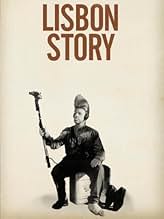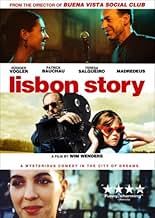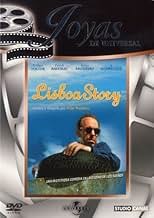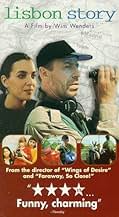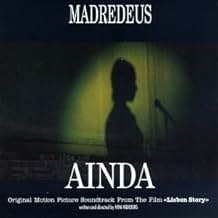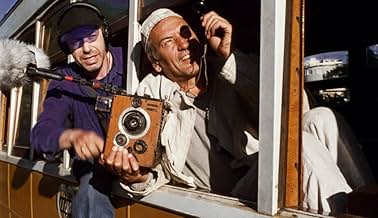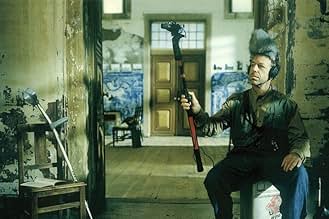Il regista Friedrich Monroe ha difficoltà a finire un film muto in bianco e nero su Lisbona. Chiama il suo amico, l'ingegnere del suono Phillip Winter, per chiedere aiuto.Il regista Friedrich Monroe ha difficoltà a finire un film muto in bianco e nero su Lisbona. Chiama il suo amico, l'ingegnere del suono Phillip Winter, per chiedere aiuto.Il regista Friedrich Monroe ha difficoltà a finire un film muto in bianco e nero su Lisbona. Chiama il suo amico, l'ingegnere del suono Phillip Winter, per chiedere aiuto.
- Regia
- Sceneggiatura
- Star
- Premi
- 1 vittoria e 2 candidature totali
Recensioni in evidenza
This is the perfect movie for the uninspired artist who is suffering from malaise, writer's block, disenchantment or perhaps just an overall pissy attitude toward the world. It's absolutely beautiful. The actors are endearing, the story is charming (though not without a few poignant touches of darkness & spookiness), and the music is downright hypnotizing.
This film gave me a big smile from beginning to end. The humour is what I call "real life silly"--these are things that have happened to us all at one point or another, and to watch the characters' reactions is hilarious, because we say to ourselves, "That could've been me!"
But overall this is a movie about love, not necessarily between people but perhaps between a person and a city or a person and a camera or a person and a microphone. It's gorgeous in its ambiguity because, like I said up front, it can inspire any of us out of our deepest rut.
In past reviews of Wim Wenders' work I have been brutally uncomplimentary; he has often struck me as a meandering type who lacks the ability to pull his visions together coherently. But this film has given me a completely new appreciation for his lucidity and ability to convey a profound (yet abstract) thought. The two monologues at the end carry perhaps the strongest messages I've ever seen on film. Simple but resounding.
I give LISBON STORY 10 stars, something which I rarely do even to my favourite films. But this movie is literally perfect, I can't criticize a single thing (edit: OK, after thinking real hard, I suppose there's one flaw... the guitarist's fingers don't exactly match up with what he's playing in one scene. But I think we can all agree that's nitpicking). Enjoy!
When I came across a reference to this movie, I simply had to buy the DVD. Interestingly, I see that the intention of the movie was to capture the spirit of the city, and thankfully it does not do so from a touristic point of view.
It captures Lisbon at an interesting time for the country, some 20 years after the revolution and 8 years after Portugal joined the European Union. And also at a time where it was modernising fast. A few years prior to the shooting of this movie, there were very old buses and the old trams (Eléctricos) ran just about everywhere and up impossibly narrow and steep roads where you could reach out and touch the houses. Now, there are just a couple of heritage routes, and these are the eléctricos featured in the movie out of necessity. Today, the transport system is completely modernised and I can see the point of the movie in trying to capture the spirit of a city before it changes out of recognition.
The use of the group Madredeus to provide the music is, I think, quite inspired. To make a movie about Lisbon could have turned into a 'yawn' if it had used a cliché of Fado. Thankfully it didn't and used something more contemporary. And what a group! The music is haunting, so much so that I have now gone off and sought out their CDs! Teresa Salgueiro reminds me of those Portuguese girls I met as a youth, she is just perfect for the part.
As has been mentioned by another reviewer, the movie is a bit self-indulgent in an 'arty' type of way, but it IS entertaining.
Finally, I prefer the movie with the subtitles turned off. The movie has a pan-European flavour with various languages popping up and intertwining. I suppose I benefit that I can grasp the gist of Portuguese when it is being spoken, and the German in the movie is basic enough that most of us will have absorbed some of it from movies and TV. Teresa Salgueiro's voice is very clear to understand when singing to those who are trying to understand the language, and is a real pleasure to listen to. To someone who may never have visited Portugal, the use of children who are fluent in English might seem odd, but in general, the Portuguese (well, in Lisbon, especially so) have always been good English speakers and I find it entirely natural to find Portuguese schoolchildren who speak English as well as Portuguese.
Waiting for the supposed main character Friedrich, played by Patrick Bauchau, to show up in the film, eventually becomes a metaphor for those times in life when one waits for the "main event", and it's a long time coming. Life is what happens while we're waiting for life to begin.
Rudiger Vogler's Phillip gets to deliver a wonderful lecture to all pretentious artists everywhere who've lost their way, and to art film-makers like Friedrich, especially. We're so happy to hear him dressing down Freidrich, and doing so more articulately than we could have done, it gives this fairly slow-moving film a wonderful sense of resolution and direction.
A very human film about the ordinary, the magic in the ordinary, and the ability of film to convey that magic. Loved it.
Who wouldn't get in love with Portugal, after seeing it..The people and country of Saudade. I won't explain you what it means, only real Portuguese know that. And even if I would like to explain,it is pointless..That can't be described, but maybe you can recognize it in Teresa's voice and landscape of Tejo who is the only witness of their lives. This story don't need actors to tell it because it is not only story between Fillip and Friedrich, but about the secrets that are hiding in wrinkles of people faces, in old aqueduct and walls of houses in Lisbon.
I hope that you get that desire to see and hear those secrets as much as I did.
Lo sapevi?
- QuizOriginally intended to be a pure promotional documentary about Lisbon comissioned by the city. Director Wim Wenders added some fictional components to the film and created a story with a thin and simple plot line.
- BlooperIn Lisbon, Mr. Winter reads a loving air mail post card received from Teresa, touring with her musical group, Madredeus in Brazil [at around 1:09:29]. The card shows Rio and Sugarloaf Mountain. However the card is postmarked May (possibly June) 7, 1994 in Portugal.
- Citazioni
Phillip Winter: Listen. You have to guess what this is.
[makes sound of horse running]
Beta: A horse! He's afraid!
Zé: Yeah, horse!
Vera: That's it!
Sofia: He's running very fast! He's galloping!
Phillip Winter: Right. And who is always on a horse?
Zé: A cowboy.
Phillip Winter: Right. And now...
[makes sound of lighting a match]
Vera: A match!
Zé: He lights a match!
Phillip Winter: [makes sound of fire]
Sofia: What's that?
Zé: He makes a fire!
Vera: Yeah, he makes a fire!
Phillip Winter: Mmm hmm...
[makes sound of frying eggs]
Zé: What's that?
Sofia: He makes something to eat. Yes, a steak!
Zé: A steak!
Phillip Winter: [pauses] Nnnehh... This cowboy is... vegetarian. Listen again.
- ConnessioniFeatured in The Sound of Lisbon Story (2007)
- Colonne sonoreGuitarra
Traditional lyrics from the poets of Fado
Music by Pedro Ayres Magalhães and Rodrigo Leão
Performed by Madredeus
Produced by Pedro Ayres Magalhães for EMI - Valentim de Carvalho Música, Lda, Lisboa, Portugal
Published by Delabel Editions / Sacem worldwide except Portugal (SPA - Sociedade Portuguesa de Autores)
I più visti
- How long is Lisbon Story?Powered by Alexa
Dettagli
- Data di uscita
- Paesi di origine
- Lingue
- Celebre anche come
- Лісабонська історія
- Luoghi delle riprese
- Aziende produttrici
- Vedi altri crediti dell’azienda su IMDbPro
- Tempo di esecuzione1 ora 40 minuti
- Colore
- Mix di suoni
- Proporzioni
- 1.66 : 1
Contribuisci a questa pagina


